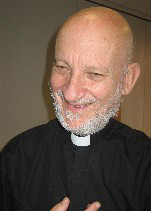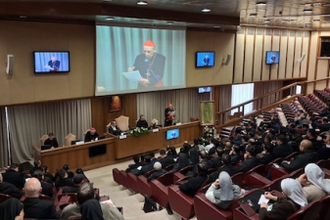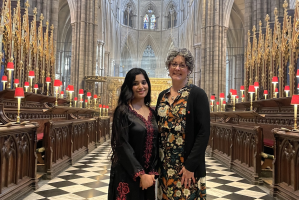Profile: Father Cyril Axelrod

In Father Cyril Axelrod, the Archdiocese of Westminster has been blessed with an exceptional priest. He speaks nine languages and can communicate with the deaf and blind in many more. Fr Cyril is the first-ever practicing deafblind priest in the world. Based at the parish of Our Lady of Hal in Camden Town, north London, Fr Cyril runs Westminster Diocese's ministry to the deafblind.
Cyril Axelrod was born profoundly deaf, into an Orthodox Jewish hearing family in South Africa in 1942. There were few facilities for the deaf in those days in South Africa. Fortunately he was sent to St Vincent's School for the Deaf in Johannesburg, which he says gave him a very good educational grounding. After a painful spiritual journey, he became a Catholic in 1965, although throughout his life he has always kept strong links with his Jewish heritage. Fr Cyril still presides over Passover meals and other Jewish ceremonies.
Fr Cyril went on to study Philosophy and Psychology in America.
One day at Mass he noticed some deaf people there were completely missing out what the priest was saying. "That was when I decided to become a priest," he said.
Following studies at St John Vianney's Seminary in Pretoria he was ordained in 1970. Fr Cyril began his ministry in South Africa with deaf and deafblind people using over eight indigenous sign languages. Defying apartheid, he established a multi-racial school for deaf children in Soweto, a hostel for deaf homeless people in Pretoria, and an employment centre in Cape Town. He also made pastoral visits to Europe, America and Asia.
In 1979, Fr Cyril received the devastating diagnosis of Usher syndrome which meant that he was gradually going to go completely blind. Undeterred, he continued his work and in 1988 traveled to Macau, where he set up many projects including a centre for deaf children, the Macau Deaf Association, and a dead social service centre. Fr Cyril arrived in the UK in 2000.
As his sight faded he learnt new skills to help him prepare for his new situation. By about 2001 he had lost all his vision. Describing himself as a "modern hermit" Fr Cyril has his own flat and copes independently doing his own cooking and housework. Braille on his phone, computer and doorbell enable him to communicate with the world. Personal assistants (he calls them his 'angels') act as interpreters and guides. Fr Cyril enjoys studying and reading. He goes to the gym and does Tai Chi. He has also become a qualified masseur.
Recently, his guide Barry dislocated his shoulder in a rugby match. After one treatment from Fr Cyril he said he felt much better.
Although he has lost his sight, he has not lost his sense of humour. On a trip to Lourdes some time ago a friend wanted him to pray for sight, but Fr Cyril, who has not much hair but sports a grey beard, said: "I told him I would pray for hair. Sometimes I feel as though I've been born upside down."
Last month Fr Cyril celebrated Mass for the deaf and visually-impaired, at Our Lady of Hal's. He invited the children to sit round him during the homily, which was based on Jesus' words: 'follow me'. After getting them to put their fists in front of their eyes to understand what tunnel vision was like, Fr Cyril spoke about the power of touch, explaining how so often in his ministry Jesus touched people. He then asked the children to go out into the congregation and touch all the people there who could not see.
"I want a world where people are integrated, not separate." Fr Cyril said.
In Westminster he is hoping to develop awareness among sighted and hearing people, and an outreach service for people with visual and hearing disabilities, to help integrate them more into the community.
He wrote recently: "The fear of being unknown can easily lead to losing faith or clinging to shyness. Jesus used the same phrase thirty-two times in the Gospel: 'Don't be afraid.' It is the matter of faith which strengthens one's confidence and trust to know what is unknown. For example, it is quite natural to feel overwhelmed when not being able to understand what deafblindness means or not knowing how to communicate with the deafblind person. To approach him or her and ask him or her to teach you the way of communication, will melt the fear of the unknown or the shyness of meeting and talking to him or her.
"..My mission to parishes is to open hope and faith that the deafblind persons receive God's message through the kindness of sighted people and that they learn to enjoy the gift of communication with them."
Fr Cyril tells the story of his remarkable life and work in his book: And the Journey Begins' ISBN 0=946252-55-6 For more information about Westminster Diocese Deaf and Deafblind services contact: Shellroca@rcdow.org.org Tel: 020 8202 3611 textphone: 020 8732 8340 cyrilaxelrod@gmail.com
A shorter version of this article is published in this month's Westminster Record.
Visit Fr Cyril's blog here: https://cyrilaxelrod.wordpress.com















